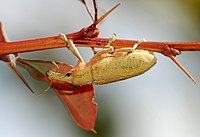
Rapid brain development and reduced neuromodulator titres correlate with host shifts in Rhagoletis pomonella
Sign Up to like & getrecommendations! Published in 2022 at "Royal Society Open Science"
DOI: 10.1098/rsos.220962
Abstract: Host shifts are considered a key generator of insect biodiversity. For insects, adaptation to new host plants often requires changes in larval/pupal development and behavioural preference towards new hosts. Neurochemicals play key roles in both… read more here.
Keywords: brain development; development; rhagoletis pomonella; host shifts ... See more keywords

Mitogenomics and hidden‐trait models reveal the role of phoresy and host shifts in the diversification of parasitoid blister beetles (Coleoptera: Meloidae)
Sign Up to like & getrecommendations! Published in 2022 at "Molecular Ecology"
DOI: 10.1111/mec.16390
Abstract: Changes in life history traits are often considered speciation triggers and can have dramatic effects on the evolutionary history of a lineage. Here, we examine the consequences of changes in two life history traits, host‐type… read more here.
Keywords: diversification; blister beetles; host shifts; meloidae ... See more keywords

Parallel host shifts in a bacterial plant pathogen suggest independent genetic solutions
Sign Up to like & getrecommendations! Published in 2023 at "Molecular Plant Pathology"
DOI: 10.1111/mpp.13316
Abstract: Abstract While there are documented host shifts in many bacterial plant pathogens, the genetic foundation of host shifts is largely unknown. Xylella fastidiosa is a bacterial pathogen found in over 600 host plant species. Two… read more here.
Keywords: parallel host; olive infecting; host shifts; host ... See more keywords

Host-shifts at family level in the Australian Acacia-thrips lineage (Thysanoptera, Phlaeothripinae) with two new species.
Sign Up to like & getrecommendations! Published in 2020 at "Zootaxa"
DOI: 10.11646/zootaxa.4816.2.4
Abstract: The Australian Acacia-thrips lineage comprises at least 250 species in 30 genera of Phlaeothripinae, all of them known only from Acacia species in Australia. Two new species from two of these genera are described here… read more here.
Keywords: thrips lineage; australian acacia; two new; new species ... See more keywords